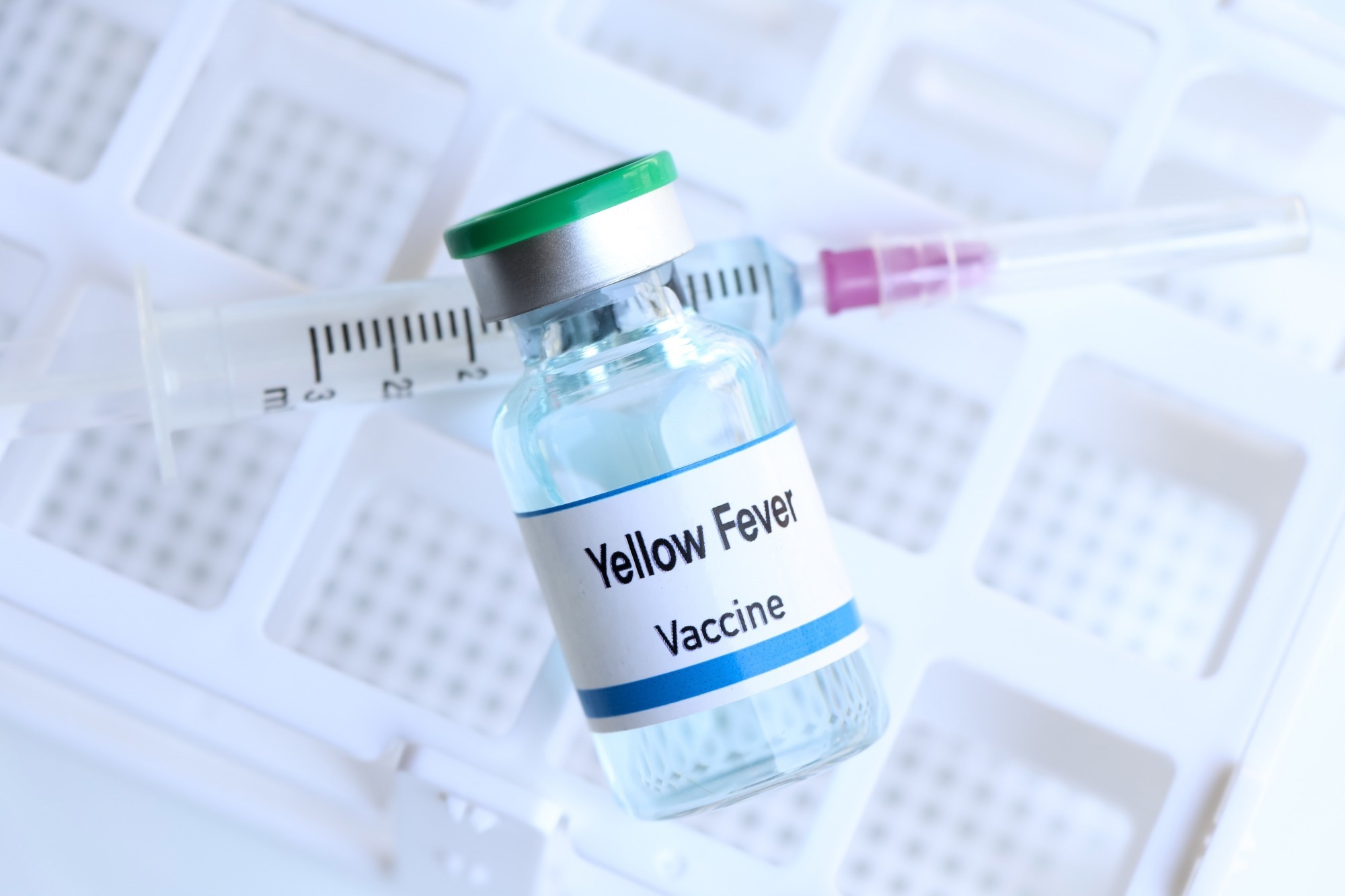They conducted a meta-analysis to understand the long-term protection offered by one dose of vaccine against yellow fever.
 Study: Long-term immunity following yellow fever vaccination: a systematic review and meta-analysis. Image Credit: chemical industry/Shutterstock.com
Study: Long-term immunity following yellow fever vaccination: a systematic review and meta-analysis. Image Credit: chemical industry/Shutterstock.com
Background
Yellow fever is a largely zoonotic disease endemic to South America's tropical regions and Africa's sub-Saharan regions. The yellow fever virus belongs to the Flavivirus genus and causes acute febrile hemorrhagic fever and jaundice.
It is transmitted to humans through Haemagogus and Aedes mosquito vectors and has a high fatality rate. Current efforts to control the disease are largely through preventative measures such as vaccinations.
The live attenuated vaccine against yellow fever was developed 80 years ago, and its implementation has been widespread.
It is known to elicit long-lasting and robust immune responses, with 94% neutralizing antibodies being detected in the recipients even after three months from vaccination. Based on recommendations from expert advisory groups, the World Health Organization stated that no booster doses of the yellow fever vaccine were required except in special cases.
However, subsequent studies have found that the evidence on long-term protection and persistent humoral immunity against the yellow fever virus was scarce, highlighting the need for an updated assessment of the long-term immunogenicity of the yellow fever vaccine.
About the study
In the present study, the researchers reviewed cross-sectional, retrospective, and prospective cohort studies and randomized controlled trials that evaluated long-term immunity after one dose of the yellow fever vaccine.
The included studies had a study population of either adults or children who had received one dose of a licensed vaccine against yellow fever at least ten years before the study and were from areas that were endemic, as well as non-endemic, for yellow fever. Participants who had received a booster dose of the vaccine were excluded from the meta-analysis.
Another criterion for inclusion was the reporting of at least one outcome of median or mean antibody titers, the proportion of participants who were seropositive for the neutralizing antibodies against yellow fever, the proportion of participants who contracted yellow fever, or the number of deaths due to yellow fever in the study population.
The meta-analysis included good to moderate-quality studies and reported seroprotection as an outcome.
A wide range of information was extracted from the studies, including the age and health status of the participants, the type of vaccine administered, and the area in which the participants resided.
This also encompassed the endemicity of yellow fever in the area of residence, the number of vaccinated individuals and controls in the study, the post-vaccination time at which the efficacy or immunogenicity of the vaccine was assessed, the serological tests used to evaluate the efficacy, median or mean antibody titers, and proportions of participants with seroprotection, breakthrough infections, or who died due to yellow fever.
The primary aim of the meta-analysis was to determine what proportion of individuals continued to have seroprotection against yellow fever ten years or more after receiving a single dose of a licensed yellow fever vaccine.
Secondary outcomes investigated the antibody titer levels and proportions of breakthrough infections and deaths.
Results
The results suggested that most individuals who received one dose of the yellow fever vaccine maintained higher than the protective threshold of neutralizing antibody titers ten years or more after vaccination.
Furthermore, the seroprotection levels were high (94%) 10 to 60 years after vaccination in healthy individuals from non-endemic regions, especially travelers.
The seroprotection was significantly lower among individuals in the endemic regions (76%) than that in non-endemic regions.
However, the researchers stated that only one endemic region (Brazil) was included in the meta-analysis since good or moderately good quality studies could not be found in other endemic areas, such as sub-Saharan Africa.
Even after adjusting for differing cut-offs for assessing seroprotection, endemicity continued to be a significant factor in determining the proportion of seroprotected healthy individuals.
The findings also suggested that children below two years of age and individuals living with human immunodeficiency virus (HIV) required booster doses of the yellow fever vaccine.
Conclusions
Overall, the study found that among individuals in non-endemic regions who mostly got vaccinated to travel, one dose of the yellow fever vaccine elicited long-lasting protection against the virus 10 to 60 years after the first dose.
However, in endemic regions, the level of seroprotection was significantly lower. Furthermore, there is a lack of good-quality research on the immunogenicity of the yellow fever vaccine from endemic areas other than Brazil, which makes it difficult to draw concrete conclusions about the long-term efficacy of the vaccine.